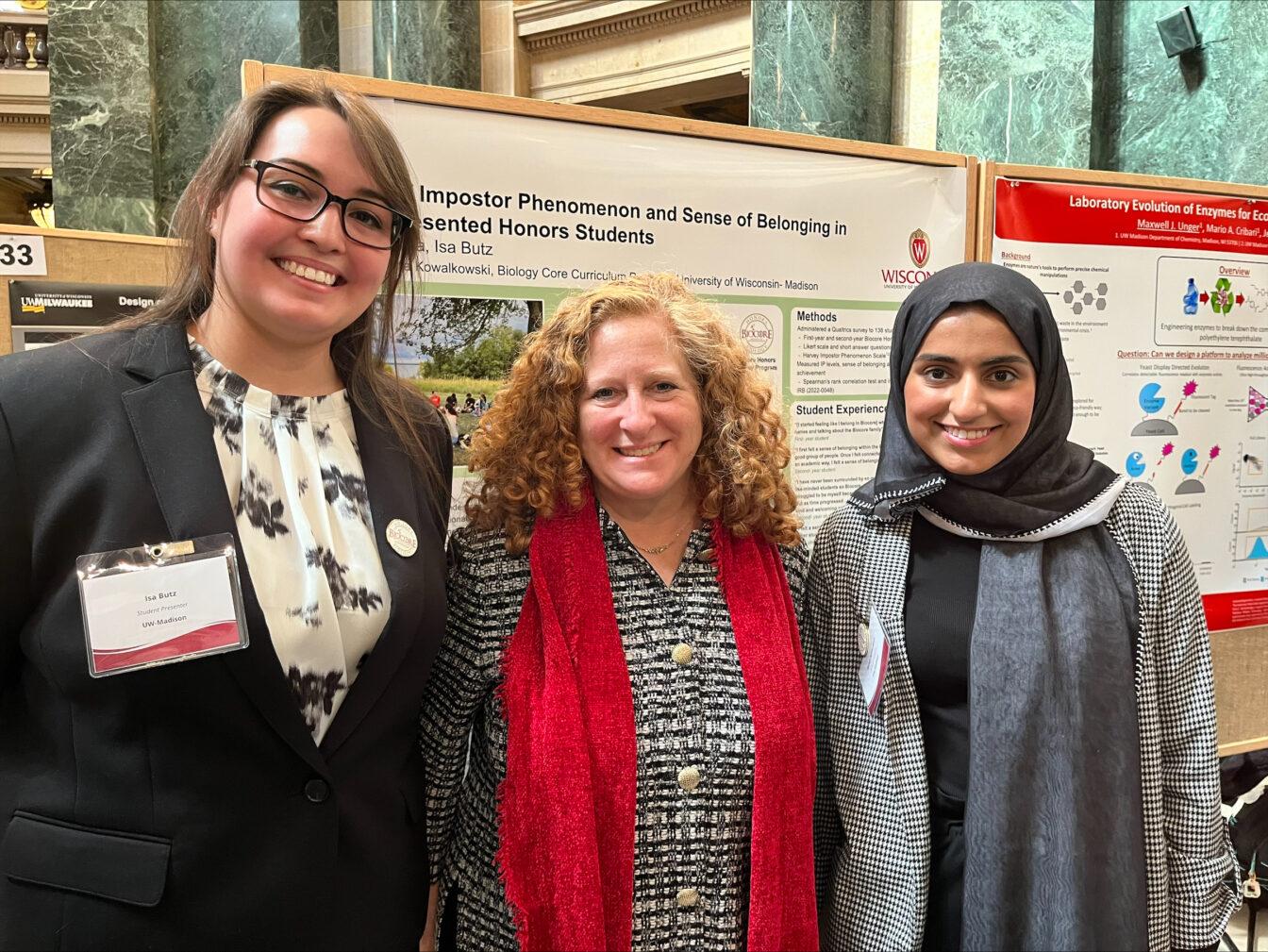Two diversity, equity and inclusion interns for the University of Wisconsin Biocore program are focusing their independent research project on finding the prevalence of imposter phenomenon within the program.
Recent graduates from the program and DEI interns, Sarah Almutawa and Isa Butz, are looking for ways to alleviate imposter phenomenon within the Biocore program. They had the opportunity to present their research at the 2023 Research in the Rotunda showcase that occurred March 8 to state lawmakers and UW faculty.
Almutawa said it is important to understand it is called “imposter phenomenon” and not “imposter syndrome.” This difference emphasizes imposter phenomenon is a short-term set of feelings that differs from a person’s normal mindset.
“Imposter phenomenon describes an individual who is high-achieving yet fails to recognize their success as being earned, but instead attributes it to external factors such as networking, luck, timing, lowering standards and their charm,” Butz said.
Almutawa said imposter phenomenon arises due to both internal and external factors. Because of this, Almutawa and Butz decided to study internal factors — Biocore’s own influences.
The Biocore program is a cohort-based, four-semester honors biology program. Students stay with the same group from the beginning of sophomore year until the end of their junior year, Butz said.
UW researchers awarded grant to study cure for devastating bat disease
“Both of us being from [an] underrepresented background felt imposter phenomenon within the Biocore because it is a rigorous, challenging program, but also due to our unique backgrounds and intensities,” Almutawa said. “We wanted to see whether that truly does impact student performance and sense of belonging in Biocore.”
The pair’s work was built on a prior study done by DEI interns on student sense of belonging, perceived academic achievement and impacts on actual academic achievement, Butz said.
Butz said they used a variation of the Harvey Imposter Phenomenon scale, which measures imposter phenomenon indicators through questions such as if people feel out of place in a program. They tailored it to the Biocore program experience using a survey questionnaire and asked their capstone course discussion sections to fill it out.
They sent the survey to over 100 students and measured their sense of belonging compared to other honors programs, whether in the nation or just at UW. Apart from some students who made light of the survey, Butz said in general students were very receptive to the study.
“We looked at Biocore data and compared it to another honors program that was not community-based at another university in Texas, which had a comparable kind of student population,” Almutawa said.
The results revealed students in general had a strong sense of belonging in the program. Almutawa said she was surprised to see Biocore students’ levels of imposter phenomenon were much lower than expected and lower than the non-honors imposter phenomenon levels.
Almutawa said they found imposter levels were also not higher in underrepresented groups, their focused population, which she felt was a key finding from the study.
The Biocore program creates a strong community feeling because of the cohort design, Butz said. There is a strong focus on small groups and a selective application process.
“We’re trying to promote this idea of generative failure where you learn from what you get wrong, which is really hard to do at an institution where everything is about grades and GPA,” Butz said. “I think providing spaces where people can say ‘This is really hard,’ or ‘I’m struggling with this,’ is something that’s often missing in other places.”
Butz said a sense of community and belonging are the biggest attributes of the low levels of imposter phenomenon within the program. There is currently no causal data — only correlational and speculative data — but there is a very strong correlation between a sense of belonging and imposter phenomenon, which leads them to trust the data so far.
Multiple sclerosis awareness month highlights need for more research, accommodations
Almutawa said the pair is now taking steps to improve the program in general. This means hiring more interns, since Almutawa and Butz are graduating from UW this spring, who can continue this research and make students feel like they are part of a community within the program.
“We’re looking into creating some sort of DEI task force within the Biocore program itself that will be composed of students from different cohorts who will collaborate on initiating DEI work and conversations in general about DEI within the programs,” Almutawa said.
Almutawa and Butz already graduated from Biocore but went back to be teaching assistants and interns. They both said the program was a positive experience for them and they wanted to give back to Biocore with their research.


















